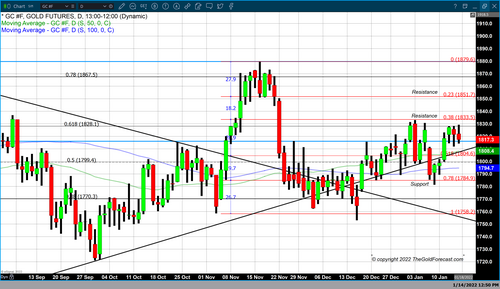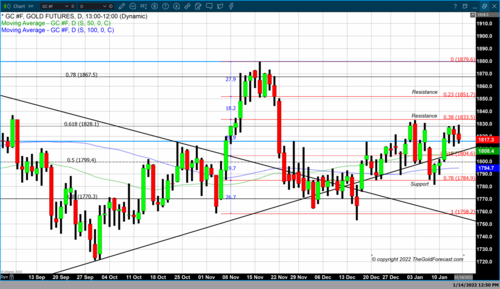
Gold has gained value during 4 of the last 5 weeks
Gold continues to trade in a range-bound manner, but over the last five weeks, gold prices have gained value during four of those weeks. Although gold has traded lower yesterday and today, ending the week with a moderate gain of 0.6%. For the most part, we have seen gold trade through the eyes of the weekly chart with a succession of higher lows. What has been lacking is a series of higher highs based upon the high achieved in June 2022 when gold topped out at $1920.

U.S. equities had mild to moderate gains, with both the Standard & Poor’s 500 and the NASDAQ composite closing higher on the day. However, the Dow Jones industrial average did close lower by 0.56%.
For the most part, market participants and analysts have factored in a much more aggressive Federal Reserve with the anticipation of three or four interest rate hikes this year. The current assumption based on information released from the Federal Reserve is that each rate hike will be ¼%. That means that if they move forward with this more aggressive monetary policy, they will raise rates only 1% this entire year which would take the Fed fund rate from its current fix of zero to ¼%. This means that by the end of 2022 fed funds rate would be fixed between 1% and 1 ¼%.
With recently released data in regards to current inflationary pressures, the Bureau of Economic Statistics has confirmed what analysts and Americans have known for quite some time, and that is that inflationary pressures continue to spiral to higher levels with the CPI (consumer price index) now fixed at 7% in December year over year.
This brings us to the current dilemma faced by the Federal Reserve. The Federal Reserve’s more hawkish or aggressive monetary policy cannot curtail the current rise of inflationary pressures to any great degree. Many analysts, including myself, acknowledge that the Federal Reserve’s Monetary Policy as it stands with a more hawkish demeanor cannot have any dramatic effect on the cost of goods and services by themselves. Any real hope of seeing inflationary pressures diminish must be accomplished through a combination of actions by the administration as well as the monetary policy of the Federal Reserve.
As the data has clearly illustrated, the current level of inflation is based upon the high pent-up demand during the first year and ½ of the recession which in essence began in March 2020. As we approach the second anniversary of the onset of the recession, which is a direct result of a global pandemic in many ways, we are much closer to understanding the new Covid-19 virus. However, that understanding has indicated that we are far from having any real handle on eradicating the virus. What is happening is that the virus has had a global impact as new waves created by mutations or variants of the original virus strain continue to wreak havoc on economies worldwide.
It seems as though the question of what a new normal will look like at the end of the pandemic contains the real possibility that there will not be a conclusion or a point in time when the Covid-19 virus simply does not exist. Rather it is beginning to seem likely that global citizens health organizations and countries will learn more effective measures to deal with the rapid spreading of variants as they emerge.
This might mean that we are currently experiencing the new “normal,” and life, as we know it from the pre-pandemic days, will never completely return. As such people will continue their daily lives with this issue and learn to adapt to it.
By Gary Wagner
Contributing to kitco.com
Time to buy Gold and Silver on the dips
David